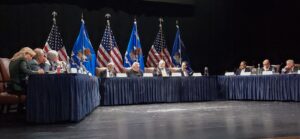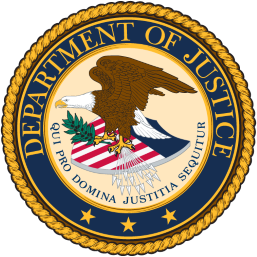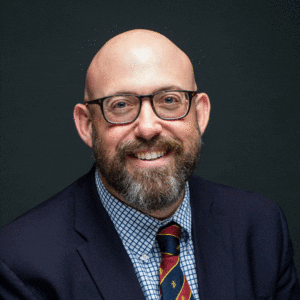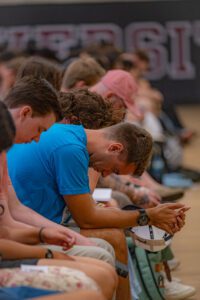Todd Williams, president of Cairn University, spoke with DELCO Today about growing up in Middletown, PA, embracing Christianity and theological studies in his early teens, and discovering his love for teaching while giving horsemanship lessons at a local summer camp.
After a forklift accident derailed his military ambitions, Williams eventually enrolled in what was then the Philadelphia College of Bible, now Cairn University. He continued to graduate school at Temple University but ultimately returned to his alma mater, serving first as a professor and then climbing the administrative ranks.
As president of the University, he now works to keep higher education mission-focused and cost-effective while expanding the university’s academic and post-graduate offerings.
Where were you born, and where did you grow up, Todd?
I was born in Trenton, NJ, and when I was three or four, we moved to Middletown, PA, near Three Mile Island, just south of Harrisburg and north of Elizabethtown. That’s where I grew up.
What did your mom and dad do?
My dad had been in the Navy right out of high school. He loved that and struggled to find his way afterward. He retired as a civilian Personnel Clerk for the Navy depot.
My mom did many different things to make ends meet and ended up as a Bookkeeper for a lumberyard on the West Shore in Lemoyne.
Where were you in the pecking order?
I’m the oldest. I have twin brothers who are two years younger than me.
What memories stay with you from growing up in Middletown?
It was a great place to grow up. We lived in a typical suburban development there, where the farms had given way to ranch houses. I used to hang out at the Star Barn, just north of our development. I’d fish in the pond and feed Mr. Hoffer’s horses.
We were outside all the time and had lots of friends running around the neighborhood, riding bikes, playing sports nonstop. I graduated from high school with people I went to kindergarten with.
Were you particularly good at any one sport?
I enjoyed all of them. I played baseball and soccer as a kid and then tried football in middle school and high school. I joined the Middletown High School soccer team when they started one, and for my last two years of high school, we were 0-18. They won the state championship years later, but we were the pioneers, and we lost a lot.
Is there one game that stands out in your mind?
Yeah, I took a pitch to the head, and I went down. It was at that moment that I realized not every blow is fatal. You can get hit and knocked down. You just get right back up and keep going. That’s a defining moment for me.
But when I started working with horses, all the other stuff fell away, including sports. I’d been going to a camp for two years where they had these three-day pack trips, and at 16, when I was old enough to work there, I did.
That first summer, I was general staff, but every time we got a break, I went to the barn and cleaned the horse stalls. The guy running the horse program eventually took me under his wing. I learned to train horses, teach horsemanship, and lead pack trips. It was a game-changer for me.
What drew you to horses? You connected with them in a way that most men never do.
As a kid, I watched old cowboy movies with my dad, who was from the Hopalong Cassidy generation. But there wasn’t a lot of stability in my life as a teenager. My parents loved and took care of us, but they didn’t always have a great marriage, and when I was in ninth grade, they separated.
Ultimately, as a result of their personal faith as Christians and other work, they got back together. But the separation broke the chain of things. I had to move out of the neighborhood I grew up in. I was struggling, and the camp came along just at the right time.
The first time I worked with a horse, I saw a lot of myself in there, in terms of the yielding of will and learning to trust and respond to authority. I learned more about myself when I learned about horses.
In my role now as a university president, there’s not a day that I don’t draw on that.
What about music? Was music a part of your life back then?
My dad was in the drum and bugle corps, and I wanted to be like him, so I played the trumpet in elementary school and sang. Even while traveling 40 miles every weekend to work at the camp, I managed to be involved in musicals, plays, and the chorus in high school.
What about college? Did you go to college right away?
I was a pretty good student, and I was in a college prep program in high school. My teachers had me reading Solzhenitsyn, Buckley, Kirk, and Burke very early on. One took me to see Tom Sowell and Walter Williams give a lecture in Philadelphia.
But no one in my family in any generation had gone to college, and I didn’t see how I’d pull it off. I thought I’d join the military, and they’d pay for me to go to law school, and then I’d get into politics. I was one of those Reagan teenagers.
But right after high school, I was run over by a forklift that busted up my left leg and shattered my ankle, and that was the end of my military dreams. That’s one of my biggest regrets, never getting to serve.
But I was eventually running the horse program at Camp Hebron, and that’s how I met my wife. She showed up as a Nurse. I was sick a lot that summer.
After we were married, she said, “Let’s go to college. I’ll work. I’m a nurse. I can get us through.”
Where did you go?
I’m presiding at Cairn University, my alma mater. At the time, it was the Philadelphia College of Bible.
Why did you choose Cairn University?
I’d been on campus before, recruiting students to work for the camp. And I was reading a book by Cardinal John Henry Newman about higher education, and he believed that one of the things that had gone wrong was that a serious study of theology had been removed from the curriculum. I wanted that component in my undergraduate work. We didn’t have a lot of academic options then, so I graduated with a bachelor’s degree in Bible.
When did you become religious?
In 1979, my dad, who was an alcoholic, drove his car off the road, trying to end his life, and didn’t. He ended up in a court-mandated rehab center, and a pastor who lived down the street from us went to visit him. My father became a Christian, and soon after that, the rest of the family followed.
I was 13 or so, and it was transformational for me. It was like encountering the horse. It reframed my whole understanding of myself and the world.
When I got to high school and started reading all these other books, I saw threads running together about moral authority and universal truths and principles that govern human experience and human nature. These political theorists and historians weren’t necessarily evangelical Christians, but they were talking about the same larger topics.
Looking back, who were the people who saw promise in you and opened up doors for you?
My dad and others did a lot to instill in me a sense of discipline and perseverance. There were a handful of teachers at Middletown High School who were incredible, and then there was Greg Pike, who mentored me at the camp.
When I got to college, a faculty member asked me about grad school and directed me to a group and organizational psychology program at Temple University. It was one of two programs in the country still working off the theoretical foundation laid by Kurt Lewin, a Jewish Prussian Psychologist who came to America in the ’30s.
Going to Temple was another of those epiphanal moments that sharpened my perspective on the world. I gained a psychological perspective on human dynamics, how people work together, and how systems work.
There were a couple of professors there, Sue Wheelan and Larry Kraft, who changed my life. They had polar opposite worldviews from mine, but they saw promise and let me do good work for them, and I learned a ton. Sue Wheelan took me on almost every consulting job that she went on. I became a good research methodologist and analyst.
How did you end up back at Cairn University?
I did my master’s in one summer and two semesters. When I finished, there were folks who wanted me to work at Temple as a research analyst, and folks who wanted me to come back to Cairn and teach social and behavioral sciences.
My wife reminded me that we started this because of the love of teaching I’d found at camp, so I took the position at Cairn in ’94 while I entered the doctoral program. Teaching is how I’m wired, and at a place like Cairn, you’re not just teaching the subject matter, you’re investing in students and getting involved in their lives.
It was such a great experience. But three or four years later, there was an opening for the senior vice president for undergrad and dean of undergraduate education.
The president at the time asked me about moving into administration. I said, “I feel like I’m really good in the classroom.” Another faculty member came to me and said, “If it’s not you, who’s it going to be? And can you work for them?” I went back to the president and said, “I’ll do it.”
Tell me about how you want Cairn University to be perceived by the outside world.
It would be great if people could understand that higher education students have lots of different interests and needs.
We serve evangelical young adults who come here to learn from people who share those commitments and teach from that perspective. Other Christian colleges want to serve a broader audience, and that’s not who we are, but at the same time, this isn’t a cloistered, separatist thing.
We believe in full engagement with the world and that all truth is worth pursuing. We just do it within the parameters and scaffolding of a Christian worldview.
Cairn is an academically sound, fully accredited regional university with a diverse array of academic programs and robust co-curriculars. Our fastest-growing programs throughout my presidency have been the business programs.
I think we’re showing that it’s possible to be a good neighbor and a good member of society without capitulating on our convictions.
What are you focused on? We’re halfway through the year, halfway through the third quarter.
We’re launching a new doctoral program and seeing growth in other programs. We started some pre-med programs a few years ago, and our first graduate is moving through his medical training.
We’re in the process of changing my job to allow me to explore speaking and writing and extend the reach of the university.
Higher education is a mess. Enrollments are down because there are fewer high school graduates in the populations most of us serve, and kids are questioning the value of a college education.
I’ve brought a mission-focused perspective to my presidency the entire time. People think college is like business: If you’re not growing, you’re dying.
But what happens is that schools overextend themselves with long-term debt. Then the demographics drop, and you have a problem. The Eisenhower administration pushed higher education to accommodate a population surge, but the baby boomers came and went, and many schools found themselves overextended.
I think colleges have to be true to their missions and not let that growth mentality cloud our judgment. You have to stay solvent to serve your population. I’m proud that we’re in a really good spot in terms of cash reserves. Long-term debt is less than 50 percent of net revenue. We live within our means.
What do you do with all your free time?
I love the outdoors. I started fly-fishing when I was a kid. I have a bird dog, and I do upland hunting. I took a sabbatical last year and got a couple of horses at my place in Upstate Pennsylvania, for the first time in 30 years. Three days in, one of the horses threw me twice. I got back on and rode him until he calmed down, but I’d broken four ribs, three of them in two places.
Just like the baseball to the side of your head?
Yeah, exactly. You get back up and get back on.
Your kids are out of the house, right?
I have a son in the Special Forces. My daughter is a Musician who’s working as an Administrator at a local business.
Are you a reader?
I read all the time, mostly histories and biographies. I have an Audible subscription because I spend so much time in the car. I just finished re-reading Barbara Tuchman’s The Guns of August.
Do you have a favorite biography?
John Adams by David McCullough. Anything on Churchill is special to me.
I once saw David McCullough in Old City Philadelphia and ran down the street to catch him, just to tell him how remarkable a book that was.
Three last questions for you, Todd. What’s something big that you’ve changed your mind about over the last 20 years?
I can’t fix everything. I can’t control everything. For most of my life, I thought, “I’m smart enough, strong enough, and right enough that I can fix everything. I can fix my family, people. I can fix institutions.” That was a big thing for me to let go of.
It’s a crazy world. How do you stay hopeful and optimistic?
Being honest about history. People are talking now like this president is the worst person that ever set foot on the planet, and I’m thinking, “Did anybody read about Nero? He lit the streets of Rome with human bodies painted with red pitch.” Some real evil has visited us as human beings, and we keep plowing on. Keep things in perspective.
I also have an honest view of human nature, our propensity to do ill, and the capacity to do good. I believe in a good and gracious God, and that all that’s good in the world is by his good hand, and all that is not because of what’s gone wrong with humanity.
There’s a proverb in the Bible that says, “Let your eyes look directly ahead of you. Don’t look to the left or the right.”
You’re not distracted by what’s on either side, you’re not looking over your shoulder at the past, and you’re not trying to see the future you can’t control. You keep your eyes straight ahead of you and keep going.
Finally, Todd, what’s the best advice you’ve ever received?
My mentor in college told me, “Take your work seriously. Yourself, not so much.” I repeat it to everybody I can.
This article was orginally published under the title “Delaware County Leadership: Todd Williams, PhD, President and CEO, Cairn University” by Ken Knickerbocker on delco.today.




